The Ghost in My Hotel Room: Adventures in the Medieval Village of Rye
By Erin Harris | Supernatural
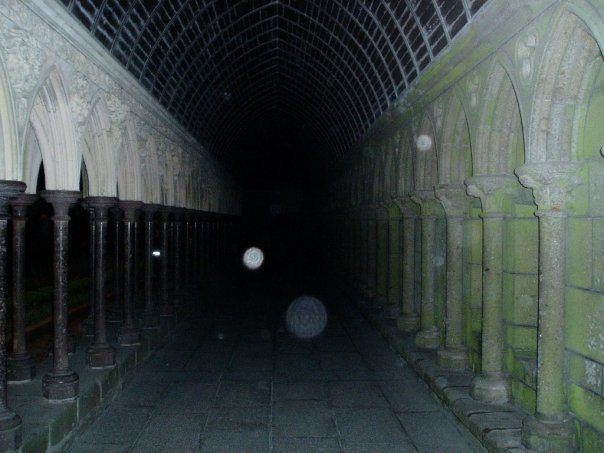
I’d been traversing the small island from Yorkshire to Sussex for eleven hours. I was now in Ashford, the last leg of my journey to Rye, and the train was down. Notice boards promised compensatory bus service to Rye, but there was no indication of from where in the vicinity of the empty rail station the bus would depart.
This worried me. It was close to eleven and I feared my hotel would close before I arrived. It was off-season, it was November, and I was anxious that all of Rye would be shut and I’d have to make a midnight journey back to London. Not a delightful prospect for a weary traveler.
After a lengthy episode involving a wrong number erroneously cited in my Lonely Planet guide, I managed get a ring through to The Mermaid. Fortunately they were still up, and I was told they even had a porter, which was impressive because I was exhausted from dragging my suitcase around the country. I had committed the most egregious act of overpacking in my life, cramming a suitcase the size of an ottoman with hardcover books, and I’d gotten used to leaving its burden with friends while daytripping with a comparatively weightless backpack.
Relieved, I hung up and started looking for clues about the veiled bus. A woman approached and asked in a German accent where the bus to Hastings would arrive. This was my bus, which was supposed to stop in Rye and terminate at Hastings.
Together we dragged our suitcases around the entry and perused posters and timetables, all with times for trains, none with information about busses.
We went outside. There were one or two cabs around, no drivers inside, and no signs of life.
We trailed back inside and around the terminal. We stood at the foot of the stairs that led up to the platforms, contemplating the advantages of hauling our suitcases up the steps.
I was drained — eleven hours of traveling — and my German friend had been laid over the previous night in Brussels, and had spent all of that day flying to various cities in the hope of eventually getting to Hastings. She said her name was Hilda, and then she turned around and noticed an elevator behind us. We rode up and asked the three people who were waiting for trains about the bus. They knew nothing.
Next we scoured the platforms for an official. We found no one, and, not expecting the bus to slide in on train tracks, we went back downstairs and outside, scanning the vacant station for one knowledgeable soul.
Hilda spotted a man sitting up in the backseat of a cab — he’d apparently been prostrate. She ran over and knocked on his window. She spoke with him briefly, and the instant she turned back, shaking her head, a bus pulled in to the drive-up. It was marked Hastings, so we got on.
I dropped into the first seat and hauled my suitcase up to topple beside me like a heavy, spineless companion. It was too fat to fit on the floor between the seats.
Hilda plopped behind me, her suitcase her seatmate, and asked me what I was doing in Hastings. I told her my plans for Rye — that it was supposed to be a lovely town and I was going to wind down there before returning to the US.
She thought it was odd — women don’t usually travel alone on holiday. She was not on holiday; she was staying with a family in Hastings to “learn English.”
I thought this was odd. Her English was substantial — we certainly hadn’t been communicating in my spotless German — and I enjoyed her reserve. She was versed in the art of understatement. She would get on well in England.
The driver had the air of a man with another job. I had the impression he’d been working all day, I guessed on the trains, and had had maybe an hour at home with his family or to sleep before he had to start second duty. He yawned as he poured tea from a Thermos into a plastic cup and stirred in milk from a tin. He was well prepared: Either he was meticulous in his rituals or he had a conscientious wife.
I asked him, “About half an hour to Rye?”
His expression didn’t change and I wondered if he heard me. He sipped his tea and stared out the window.
Finally, after several long moments, he murmured, “I reckon about that.”
Three more passengers boarded, and then the driver closed the door and started the engine. My suitcase swayed into my lap as we wound around roundabouts toward the motorway.
I had full view of everything: The empty road, the wayside trees, the driver, the passengers — the latter two reflected in the windshield by dim aisle lights. Faces were superimposed over the road as we exited the motorway and turned onto a narrow, winding lane. The passage was dark, lined with stone fences. Sheep slept close to the stones, their closed eyes and somnolent faces illuminated by our headlights. For a stretch, tall beeches loomed like pale specters in an arch over the road.
I asked the driver, “Is this Rye?”
He gave no indication of having heard me. He was consulting a map, which he held in his left hand. He raised his eyes to the road and dropped them back to the map. He steered cautiously.
Finally, after several long moments, he murmured “no” benignly, as if to compensate for his strange pause.
We coasted through town and rolled through countryside, past stone cottages and more sheep, slowing when an approaching car neared to squeeze through the tiny lane. It was difficult to see: in the eddies of fog and black, little was visible on the dark road.
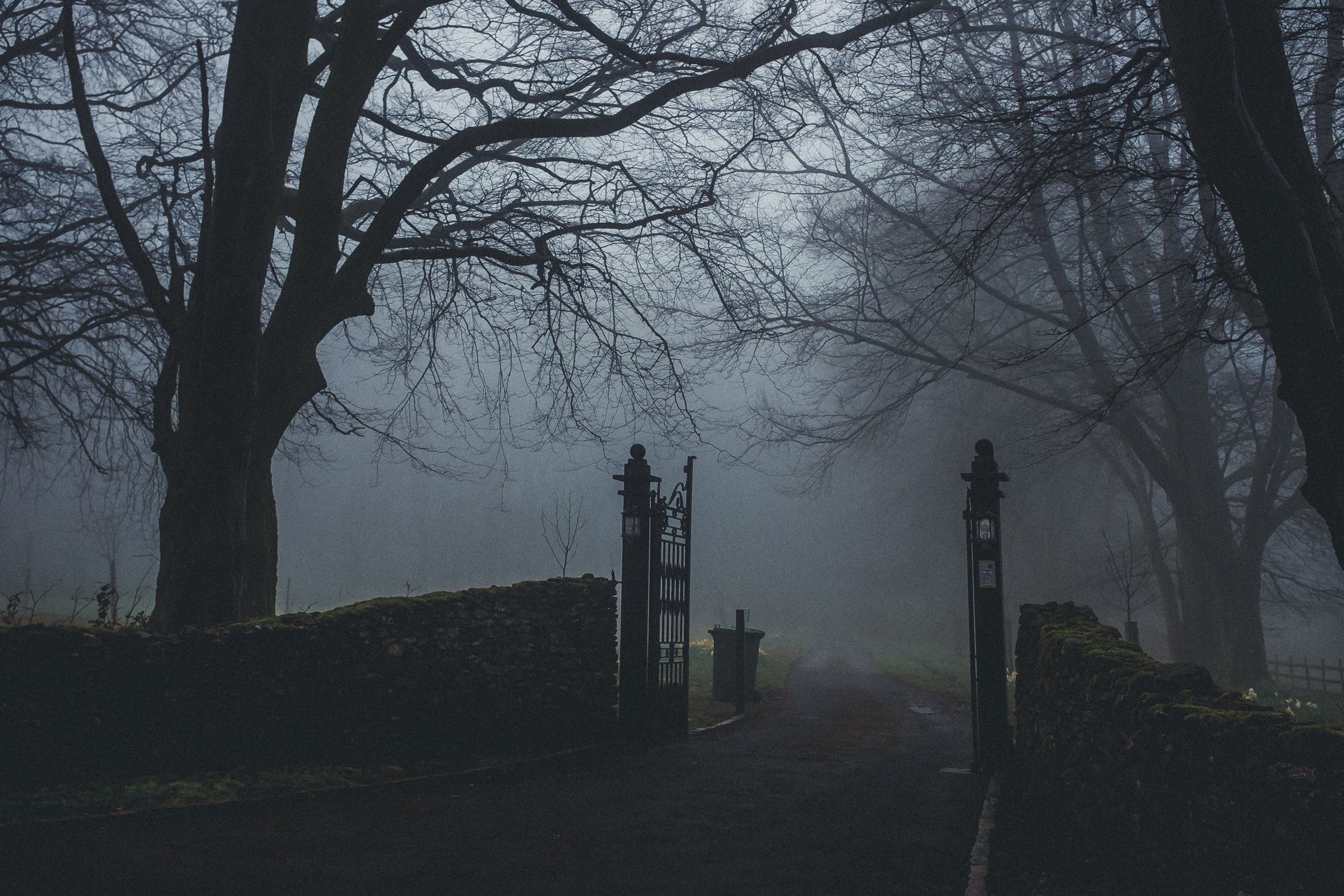
Behind it was darkness; before it was nothing.
But the driver pushed the door open and waited. I couldn’t tell for what.
I knew this couldn’t be Rye. Rye would have shops and houses and cobbled streets and half-timbered buildings.
This was a vacant gateway, a darkened portico. The fog spread in through the door like a phantom investigating our mysterious pause.
But the door opened to nothing else. No one got in and no one got out.
Minutes passed.
And then, abruptly, the driver closed the door and plowed on, taking the bus to the very top of each gear before shifting, so that it lurched as we pressed on down the dark road.
We wound round a curve and stopped in front of a small rail station. I wished Hilda well, thanked the driver, and maneuvered my suitcase down the stairs, into the dark and vacant town.
I had few coins for a cab, but it didn’t matter. The streets were empty; there were no cabs. I pulled out my guidebook and consulted its tiny map of Rye. The Mermaid was uptown, straight ahead and then toward the right. The direction was clear, but it was impossible to estimate the distance.
I didn’t foresee that it would take twelve hours to travel less than three hundred miles.
I didn’t envision arriving near midnight.
Maybe it would have been more sensible to stay in London near Victoria station, where I had to get the train to Gatwick in two days, but I had decided to chill down in a quiet medieval town, as I’d done in Chartres and Bern at the ends of my trips to France and Switzerland.
In England, I had been staying with friends in London and Yorkshire, and this was my chance to end my trip on a solitary, reflective note.
Presently I was in Rye, exhausted, starving, freezing, and dripping snot. It would be loud and obnoxious to clatter uptown, but I had no choice. I pulled my suitcase behind me and the wheels clacked on the cobblestones like echoing hooves.
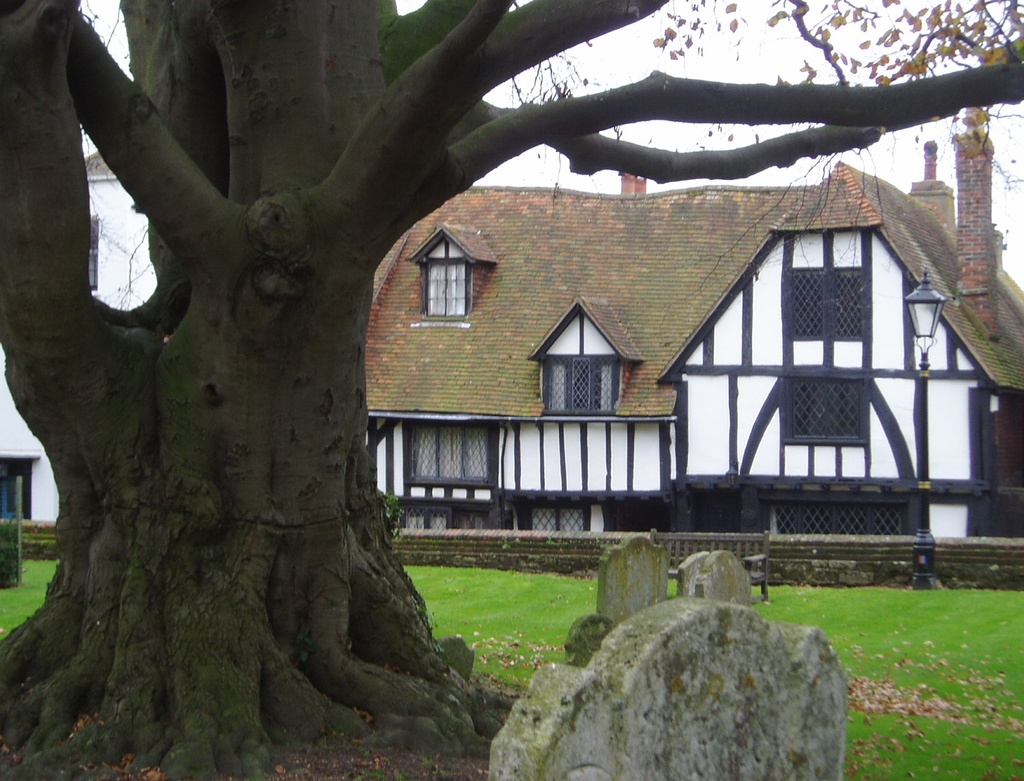
Rye by day
It was ludicrous, the racket, and I chuckled at myself all the way up to the High Street. There I found a delivery guy who said The Mermaid was off the bend of the Mint — whatever that meant. He said I should turn left “straight on by the blue car,” then right on the next street. It was unclear which blue car he meant, and unclear where the side street was, but I failed to clarify his directions because I was tired and he seemed weird.
So I approached false alarm after false alarm, alcoves that resembled crossings and turned out to be houses set further back from the street than others.
My suitcase and I clacked on.
Finally I came to Mermaid Street and induced that it would be a likely spot for The Mermaid Inn. I turned left and noted another hill. I was hot from exertion, but my hands and face were frozen from the cold air. My legs were getting weak as I maneuvered my suitcase up a narrow sidewalk — too narrow, really, for the suitcase.
I veered into the street, laughing with shame at the volume of my noise, the decibel of my midnight arrival in a quiet town off-season on a Sunday. The stones were inherently uneven and kept trying to trip me as I zigzagged through what looked like the easiest path for suitcase wheels. I stopped for breath, looking up at where Mermaid Street met West Street, catching wind of cool air and enveloping atmosphere, everything so old and so quiet. For a moment, as I stood there in the darkness and the beauty, the town was mine.
Then I turned and saw that the building I stood in front of was The Mermaid.
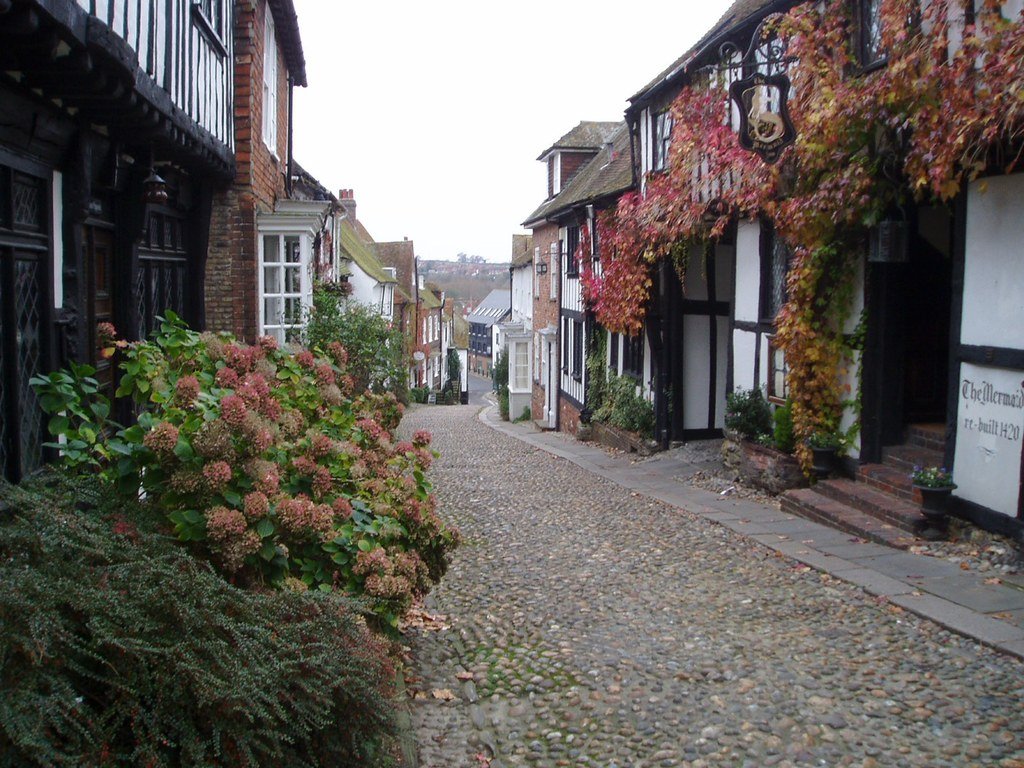
Mermaid Street by day
I leaned on the counter, wiped my red nose with a tattered Kleenex, and mumbled exchanges through frozen lips set like stone between numbed cheeks.
I was reminded that there was a porter, and I savored a sense of relief as he carried my suitcase up two short, narrow flights of stairs, then to the right toward a doorway that led to a trio of rooms that may at one time have been one room.
Even an active imagination can’t conceive of how much must have been and changed in the 900 years of the hotel’s operation. (The original edifice dates from the twelfth century; the current Mermaid was rebuilt after a fire in 1420.)
The porter was a mild-mannered fellow, soft-spoken and reticent. He reminded me of the bus driver, with his long, ambiguous pauses, who stopped at phantom stops to let people on who weren’t there. And he reminded me of the innkeeper in the film The Woman in Black, who speaks little, except to ask Arthur Kipps, who like me, arrives late at night, “ave you et?”
He seemed to have inhabited The Mermaid since its inception, so I asked him about the resident ghosts (the reason I had chosen The Mermaid). Had he seen them? Where did they appear?
His answer was slow in coming, then languid and elusive.
“There’s no way to tell,” he said, “what they are. They’re just a mist-like.”
“What do they do?” I asked.
Slowly, he pointed behind me, toward the landing, dark but for the glow of a painting of the Virgin Queen bearing a white ruff and a stony expression.
“Make odd noises — strange sounds you can’t make out.”
This seemed vague, just generalities to intrigue tourists.
I was captivated.
But I also thought…
Then the porter opened the door to my room. The door was thick, made of uneven planks, and fixed to the jam with heavy iron brackets. The room was warm and pleasant with a four-poster bed and a beamed ceiling. The windows were mullioned; there was a little door on one wall that connected to the adjoining room. The bathroom was modern, but the bones of the room were medieval.
Two floors above the atmospheric street I admired when I stopped for breath, it gave me a feeling of warmth and security, a feeling of toasty comfort I hadn’t felt since I lived in my sloped-ceilinged bedroom in high school, a room that looked over the street and my neighborhood from a level that made me feel insulated.
I got into my nightclothes and lounged on the bed, reading through the brochures I found on the desk next to the kettle and the alarm clock. I learned that the aforementioned monarch stayed at The Mermaid in 1573. Henry James’s house, which I had come to see, was around the corner. I could get beer and cheese delivered to my room at any time. This was enticing, but I was more tired than hungry. I was weary and glad to have the next day to spend quietly.
Aside from this, I didn’t know why I had come to Rye. It didn’t have a cathedral like Chartres or Winchester, but it had a pull, and I sank into the tiny twin mattress with the hope of finding it the next day.
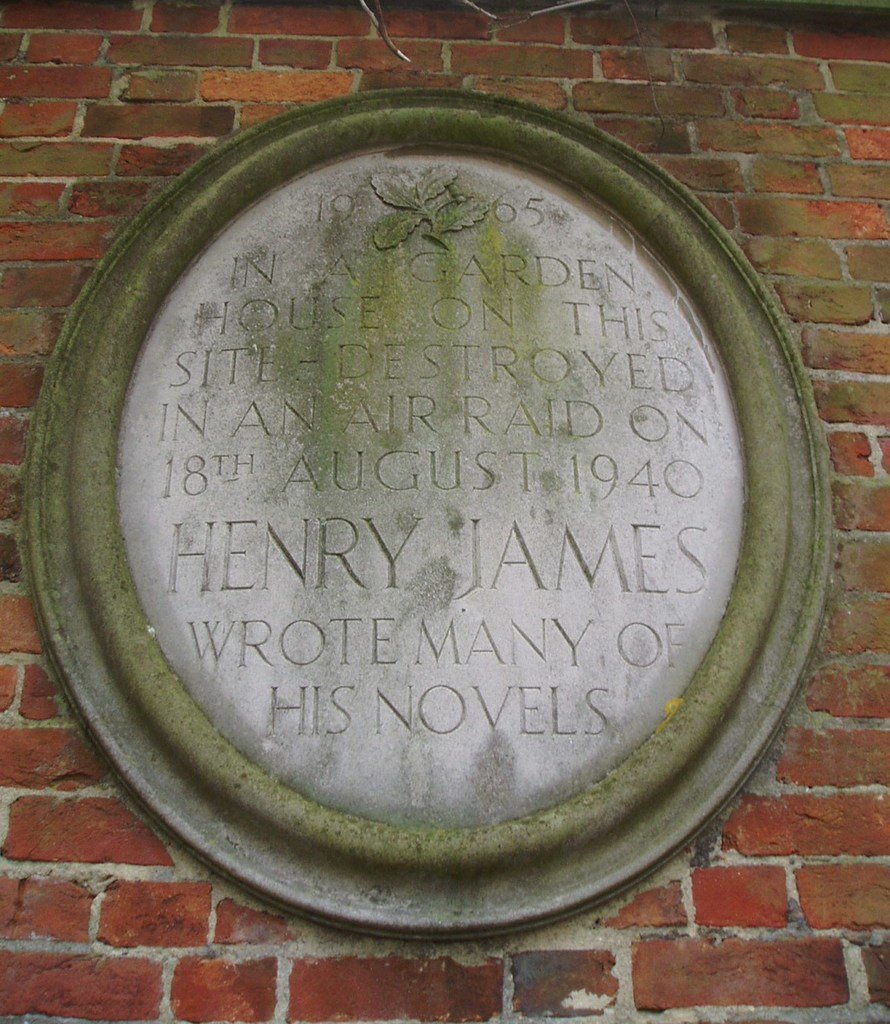
Which I did
…tucked under a quilt with an oddly comforting smell of dust… when I became aware of a presence behind me, standing over my bed. It was tall and male.
I sometimes have these feelings — impressions — of spirits, and am not often sure if they’re real. But this was something that seemed to have observed me and then stood next to my bed as I was about to sleep.
I lay still, chilled that it had waited till I was nearly asleep.
I didn’t have a bad feeling, though I was definitely afraid.
I often have the feeling, in these situations, that if I moved deeper into the experience, if I moved beyond the threshold of caution, if I really wanted answers — who these people are, what they want, why they reach out to me — I could find out, and they would appear in fuller form.
There was a time in Chartres when the ghost from a novel I was writing at the time would have appeared to me if I had allowed her to. But then, as now, I exuded a strong objection. This was not the time.
I tend to ignore presences, to consider them only vaguely, to shut my mind from deeper consideration, to concentrate on other things that occupy my mind at these times. I think these presences are related to my writing, drawn by the creative spirit, attracted to my fiction. I think they can help, or have something to offer, but I’m not ready to be receptive. I think these presences are related to the writing of my ghostly novels, but for now I ignore them.
And I’ve been fortunate, in not being ready, that they are mild and not forceful, and seem to respect the kairos, or what I view as the right time, whenever that might be.
I concentrated on a ring of white light surrounding my body, visualized it circulating, threading around me as I followed its course with closed eyes. And I concentrated on how these experiences are more for my fiction than for me, though these two things are the same.
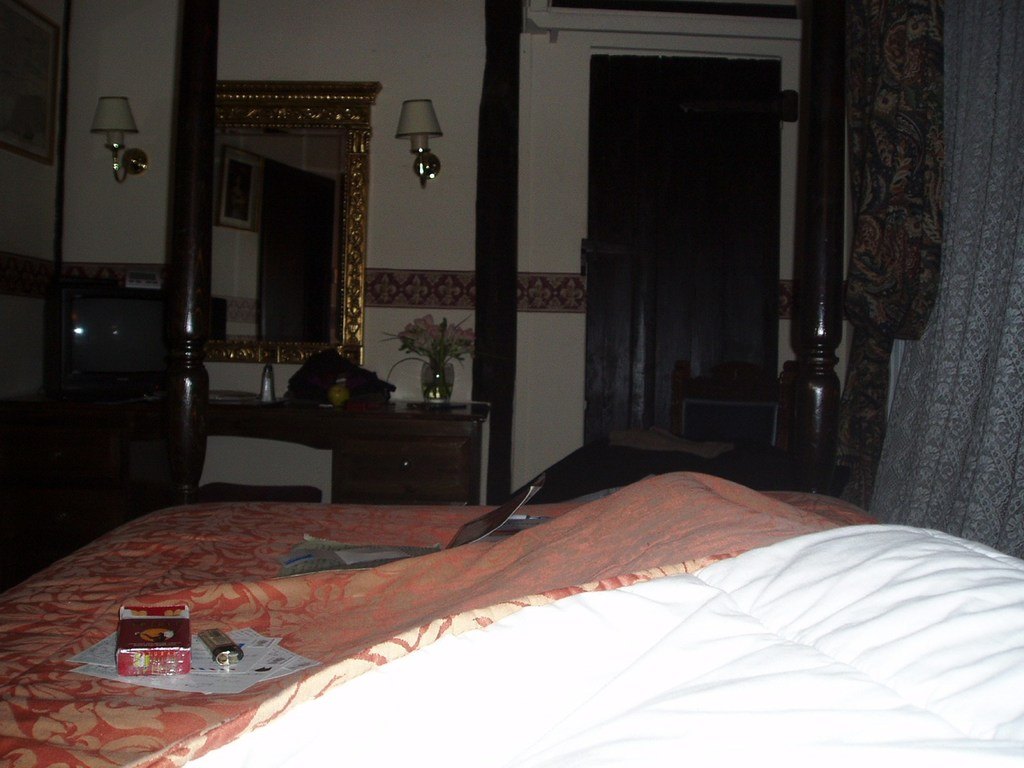
Eventually I worked up the guts to turn the lamp on.
I could feel that the presence was still there, standing, watching, waiting (for what?), but it was dimmer. I reached for my notebook and wrote as though I were being observed by an animal that could communicate intuitively but would be unlikely to speak.
I wrote about why unknown things should desire to approach you at your bed. One reason is that in sleep the unconscious moves away from logic. This makes sense particularly if apparitions are projections of the self. Was there really a presence next to my bed, or was my creative unconscious just excited by exhaustion, and now rest, not to mention gothic tales, being around the corner from the house of the author of The Turn of the Screw, and in the mind of my own novel?
The presence diminished further, became more distant, as I wrote. I then scratched a poem down quickly — good in some ways, trite in others . . . suffice to say I wrote a poem (poems don’t often come to me anymore), and I understood then why Henry James lived in Rye.
Once I had written for a bit, I felt I could sleep. I left my notebook and pen within reach and turned off the light.
It was quiet for a while. I drifted and neared sleep again.
Odd sounds, like someone tapping on a pipe with a tiny hammer.
I kept thinking, as I’d thought on the threshold, that it would have been unnatural not to hear random noises in a place so old.
But the tapping was intermittent, irregular. There was no steadiness, no predictability to it, no rhythm; it was sporadic and alarming and strange.
Logic kicked in and I decided it was a radiator clinking. My radiator was off, but it could have come from another room.
Or maybe it was a plumbing pipe.
It was under the floor.
Every tap came from a different part of the floor.
It moved around under my bed. It wasn’t there before, and now it was jumping around without pattern, tapping without rhythm, each tap getting louder and echoing like a small dull drum.
I searched the darkness for reason and wished vehemently for it to stop. I reached for my notebook and wrote in the dark:
Just stop and let me sleep. I’m not going to talk to you. Just stop and let me sleep. I’ll write, but I won’t talk to you.
It stopped.
I closed my eyes.
Moments passed, and I counted them.
Then it started again, intermittent tapping, chilling, bizarre, raucous in the surrounding silence.
But I was too tired for games. I closed my eyes and slept.
Top photo: Spirit balls (indubitably) in the cloister at Mont St. Michel, France, taken by me. Foggy gate photo by Chanita Sykes on Pexels. Other photos of Rye by me.
The Simplest Email to Keep Your Customers Coming Back
Today’s a Good Day for Art
Today I Did Something Crazy Because I’m Sane
What Do the Mona Lisa and Mount Rushmore Have in Common?
A Surprising Trick to Get Your Writing Juices Flowing
How Margaret Atwood Helps Me Write
My Room in Roscoff
Why I Hate the Present Tense Right Now